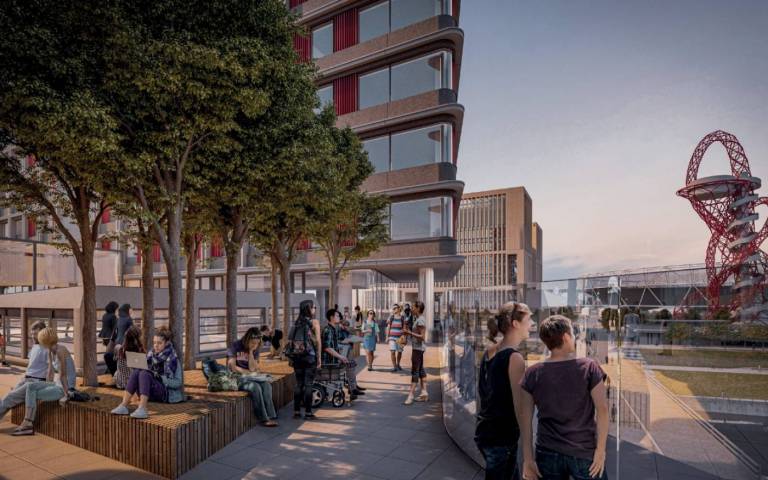10 years on from London 2012 - the Olympic and Paralympic legacy story
07 June 2022, 1:00 pm–2:00 pm

This Lunch Hour Lecture will look at the Olympic and Paralympic legacy 10 years on from London 2012.
This event is free.
Event Information
Open to
- All
Availability
- Yes
Cost
- Free
Organiser
-
UCL Events
Book your place
About the lecture:
Victoria Austin will look at how disability inclusion was embedded in London 2012 and how the paralympic legacy model has been used to build the Global Disability Innovation Hub. Saffron Woodcraft will speak about legacy and livelihood security in east London and Penny Bernstock will review London 2012’s housing legacy and the broken promises. Clare Melhuish will discuss culture and heritage in the Olympic Legacy and lifelines in a changing landscape.
The lecture will be chaired by Pro-Provost (UCL East) Professor Paola Lettieri, who has led on the development of UCL's new campus on Olympic Park at East Bank, the new education, culture, innovation and education district legacy of London 2012
With UCL preparing to launch a new campus on Queen Elizabeth Olympic Park in Stratford in east London, this lunch hour lecture series brings together speakers to discuss some of the research that will be taking place at our UCL East campus, which will begin opening from September 2022, offering exciting new degrees in cutting edge new UCL schools and centres.
About the Speakers
Victoria Austin
Co-Founder and CEO at Global Disability Innovation Hub
Victoria is CEO of GDI Hub CIC a non-profit social business based at UCL East, with the bold vision of driving disability innovation for a fairer world; as set out in our new strategy. GDI Hub (www.disabiltiyinnovaiton.com) is continuing the legacy from the 2012 Paralympic Games in London, which Victoria led for three Mayors. Launched in 2016, GDI hub has now reached more than 22m people, exchanging learning and practice with more than 70 partners in more than 41 countries. Previously Victoria was Head of Paralympic Legacy, Inclusion and Sports Participation at Queen Elizabeth Olympic Park where she led the Paralympic Legacy Programme pre and post-2012. With a background in urban regeneration and social justice Victoria holds a Masters degree from UCL in Social Development Practice, and is about to submit her PhD on technology and disability justice in Sierra Leone. She has worked in more than 30 countries globally.
Saffron Woodcraft
Principal Research Fellow at Institute for Global Prosperity (IGP)
Saffron Woodcraft is Principal Research Fellow at the Institute for Global Prosperity (IGP) and Executive Lead of IGP’s Prosperity Co-Lab (PROCOL) UK. She leads the Prosperity in east London 2021-2031 longitudinal study looking at the social and economic impacts of Olympic regeneration on communities in Newham, Hackney, Tower Hamlets, Waltham Forest, and Barking and Dagenham. Saffron works collaboratively with citizen scientists, community organisations, government policymakers and business decision-makers to bring local understandings of prosperity into planning and decision-making processes that produce place-based strategies. She focuses on developing citizen 'social' science as a method for co-producing policy-relevant knowledge about pathways to prosperity, translating lived experience into new prosperity metrics, and developing new forms of partnership and collaboration for action on place-based prosperity. Her current work includes research on relationships between regeneration, inclusive innovation, and secure livelihoods in east London.
Dr Penny Bernstock
Senior Research Fellow(Visiting) at Institute of Global Prosperity
Dr Penny Bernstock has worked on research related to the regeneration of East London for more than thirty years. She has previously directed the Centre for East London Studies at UEL and is currently a Senior Research Fellow(Visiting) At the Institute of Global Prosperity. She has published widely on the Legacy of London 2012 including ‘Olympic Housing A critical review of London 2012’s Legacy'.
Her current research focus is on housing and employment on the Queen Elizabeth Olympic Park, where she is exploring ways to promote good growth/inclusive regeneration for existing low-income communities in the legacy boroughs.
Since 2018 she has been working with TELCO(The East London Citizens Organisation) to lobby for a more inclusive legacy. She is a board member of London CLT and co-Chair of TELCO's Olympic Strategy Group.
Clare Melhuish
Director and Principal Research Fellow at UCL Urban Laboratory
Clare Melhuish is Director and Principal Research Fellow in UCL Urban Laboratory, where she undertook research into the role of university spatial development projects in urban regeneration and the production of cosmopolitan urbanism and imaginaries in the UK and abroad. She is co-ordinator of the Curating the City research cluster in the UCL/University of Gothenburg Centre for Critical Heritage Studies, and leads on Urban Lab’s Urban Heritage research priority area. She is co-editor of, and a contributor to, the new book Co-Curating the City: universities and urban heritage past and future (eds Clare Melhuish, Benesch, H., Martins Holmberg,I. and Sully, D), from London: UCL Press; and author of the chapter ‘Cultural and heritage infrastructure as “lifeline” in east London’, in Lifelines. Politics, ethics, and the affective economy of inhabiting, co-edited by Urban Lab Co-Director Camillo Boano and C. Bianchetti, forthcoming from Berlin: Jovis
 Close
Close

